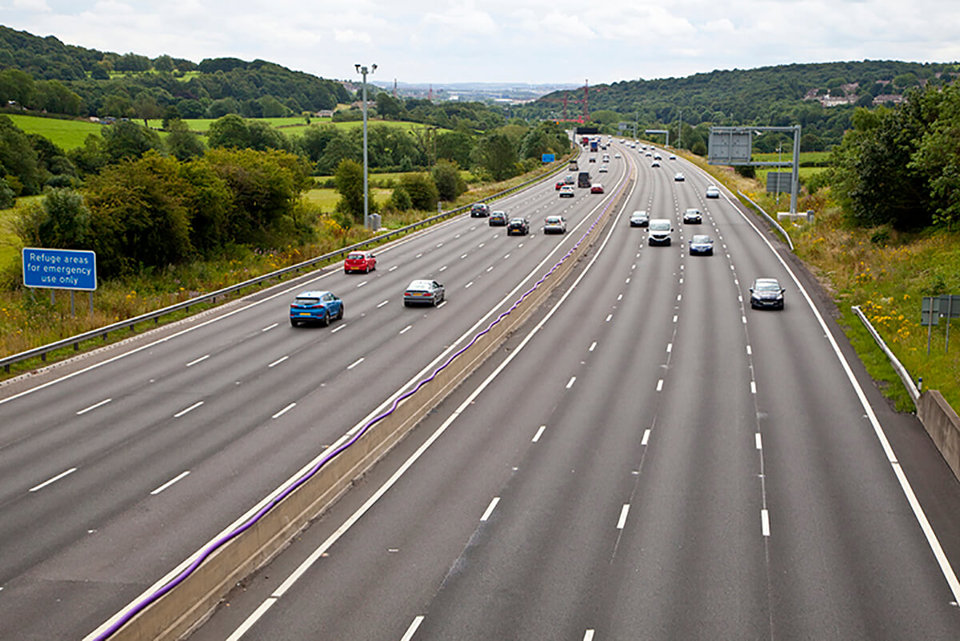The use of ‘stealth’ speed cameras risks them being seen as a revenue raising tool rather than a deterrent, according to the Institute of Advanced Motorists (IAM).
The warning comes after new grey cameras, rather than highly visible yellow cameras, were mounted on stretches of the M25, and are being introduced to the M1, M3, M6 and M60 motorways.
The new Highways Agency Digital Enforcement Camera System (Hadecs3), enforces variable speed limits on motorways when they are congested, but when the speed limit is 70mph the cameras continue to target drivers.
Tim Shallcross, IAM head of technical policy, said: “The widespread use of mobile cameras, and lately the introduction of fining people for exceeding 70mph on sections of managed motorways, reinforces the perception that they are revenue raisers.”
When first introduced, most cameras were grey and in the 1990s regulations were introduced to make them visible so they would be more of a deterrent.
“It is hard to understand why camera partnerships or other safety camera operators are now going back on this policy,” continued Shallcross. “We have worked hard to promote the safety benefits of cameras and the current tendency to make them inconspicuous risks undoing much of that work.”
IAM’s fears appear to be well-founded, after a Fleet News poll revealed that two-thirds (66.5%) of respondents said speed cameras didn’t benefit road safety.
However, the Highways Agency has defended the cameras. A spokesman told Fleet News: “Variable speed limits on smart motorways are primarily there to smooth traffic flow, reduce congestion and make journeys more reliable.
"Hundreds of thousands of motorists use this stretch of the M25 every day. The vast majority are sticking to the speed limits and are experiencing better journeys as a result of smart motorways.
“There are clear signs where cameras are in place and the new cameras are more visible than the previous versions.”
Dave Nichols, professional engagement officer at Brake, continued: “It’s disappointing that so many people surveyed by Fleet News feel speed cameras don’t benefit road safety.
“Our own surveys have shown that the majority of people accept that speed cameras do a good job of reducing speeds and saving lives, and almost two in three drivers said more enforcement, including cameras and traffic police, would persuade them to take more care on the road.”
The road safety charity argues that all speed cameras, including the new ‘stealth’ cameras, are an effective way of reducing speeding. “If you don’t break the speed limit, you won’t get caught by a camera,” said Nichols.
A four-year national evaluation of more than 4,000 speed camera sites across the UK found a 70% reduction in speeding at fixed sites, a fall of 6% in average speeds and a 42% reduction in deaths and serious injuries.
Nichols added: “Average speed cameras on motorways are visible and drivers should recognise signs telling them they are in an area where speed enforcement cameras can operate.
"They are particularly beneficial as they enforce limits over a longer stretch of road, discouraging drivers from only slowing down briefly for each camera, and then speeding up again and continuing to put lives in danger.”
In 2013, the number of people fined for speeding peaked at more than 115,000 – the highest level since 2009.
After the first Hadecs3 cameras were installed between junctions five and six of the M25, figures from Kent Police showed that 668 speeding offences were logged in just over two months.
Nichols concluded: “We would urge all drivers to stay well within the limits, regardless of whether there is a speed camera or not.”





















Tranman - 09/02/2015 10:48
No one will ever convince me that the majority of speed cameras are anything but revenue raisers. I dont have a problem with speed cameras in towns, especially where there are schools, hospitals or pedestrians etc but if the so called: Safety Camera Partnerships, had any interest in road safety, they would be promoting advanced driver training rather than just looking to fine as many people as possible and organisations like brake, should be doing the same instead of simply whinging about speed all the time. Accidents are not caused by speeding, they are caused by inappropriate speed for which it would be far better to actually talk to and educate people about the effects of inappropriate speed. It would save more accidents.